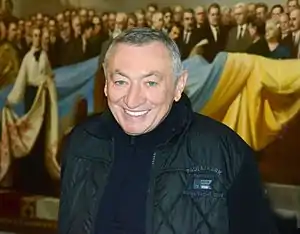Eduard Gurwits
Eduard Yosipovich Gurvits (Ukrainian: Едуард Йосипович Гурвіц; Russian: Эдуард Иосифович Гурвиц; Yiddish: עדואָרד יאָסיפּאָוויטש גוּרוויץ; born 30 January 1948) is a Ukrainian politician, Mayor of Odessa in 1994–1998 and from 2005 to 6 November 2010.

Biography
Eduard Iosifovich Gurvits was born on 30 January 1948 in Mohyliv-Podilskyi, in the Vinnytsia Oblast of the Ukrainian SSR, Soviet Union. He attended the Leningrad Engineering and Construction Institute and graduated as an Engineer of Communications. Gurvits was drafted into the Soviet Army in 1971, where he served as a private in the Strategic Rocket Forces. After leaving the army he worked as a master construction foreman in Moldova and Odessa. In 1987, he created and headed one of the first Soviet manufacturing co-operatives, the Experimental and Creative Studio 'Ekopolis'. In May 1990 he was elected head of Odesa's Zhovtnevy district council and in 1991 became the head of the Zhovtnevy district executive committee. In April 1994 Gurvits was elected Deputy of Verkhovna Rada in Ukraine and in July 1994 was elected Mayor of Odessa.
In March 1998, Edward Yosipovich Gurvits was re-elected as Mayor, by a margin of 70,000 votes. Due to pressure by then President of Ukraine Leonid Kuchma, the Kirovograd Regional Court of Appeal declared the elections void. The same court barred Gurvits from participating in further election. It is speculated that these events were influenced by Gurvits' support of former Prime Minister Pavlo Lazarenko.
In 1999, he supported the renaming of Griboyedov Lane into Shukhevych Street, saying:
We renamed Griboyedov Lane into Shukhevych Street — an enemy of the KGB who fought with KGB agents in Western Ukraine. And now our SSU is at the corner of Shukhevych and Jewish.[1]
Gurvits survived two assassination attempts and two of his close associates - Igor Svoboda and Sergey Varlamov - were kidnapped. (The body of Varlamov was recovered in 2005). Also in 1998, Gurvits was elected Deputy of Verkhovna Rada from the Suvorovsky district of Odessa.
In 2002, Gurvits participated in new mayoral elections, but lost to Rouslan Borisovich Bodelan. Later, in 2005, the Primorsky district court of Odessa declared the elections invalid and proclaimed Edward Yossyfovych Gurwits Mayor of Odessa. During the 2006 elections, Gurwits was formally elected Mayor of Odessa. He supported the pro-President Viktor Yushchenko political bloc, Eduard Gurvits's Bloc Our Odessa, during the simultaneous Odessa city council elections.
After the failing of Odessa to become one of the host city's for EURO 2012 President of the Ukrainian Football Federation Hryhoriy Surkis stated (in mid-December 2009) that "The Odesa mayor promised a lot and did little".[2] Mayor Gurvits in 2010 was running for election for the party Front for Change.[3] But lost these elections with 30.8 percent of the votes.[4]
Gurwits returned to national politics as number 16 on the party list of UDAR of Vitaliy Klychko for the 2012 Ukrainian parliamentary election.[5] He was elected into parliament.[6] In the 2014 Ukrainian parliamentary election Gurwits tried to again win a seat as number 96 on the electoral list of Petro Poroshenko Bloc.[7] But Petro Poroshenko Bloc won no more than 63 seats and thus Gurwits did not return to parliament.[8]
In the 2015 Mayoral election of Odessa Gurwits came in third with 8.5% of the vote.[9]
In the 2020 Odessa local election Gurwits is again candidate for Mayor of Odessa (nominated by Eduard Gurwits Bloc).[10]
Private life
Edward Gurvits is divorced. He has two children: a daughter, Evgenia, born in 1975, who lives in Kyiv and a son, Stanislav, born in 1983, who lives in Haifa, Israel. He also has two grandchildren: Masha, born in 1996, and Misha, born in 1999, who are living together with their parents in Kyiv.
See also
References
- https://zakarpattya.net.ua/Blogs/85117-Shukhevych-v-Odesse
- Surkis says Odesa mayor promised much, did little with respect to Euro 2012, Kyiv Post (15 December 2009)
- Front for Change Party leader: Authorities trying to upset election in Odesa, Kyiv Post (16 October 2010)
- Party of Regions candidate wins Odesa mayoral race, Kyiv Post (5 November 2010)
- Klitschko's UDAR approves party ticket, Kyiv Post (1 August 2012)
- (in Ukrainian) Список депутатів нової Верховної Ради, Ukrayinska Pravda (11 November 2012)
- (in Ukrainian) Petro Poroshenko Bloc election list, Ukrayinska Pravda (19 September 2014)
- Poroshenko Bloc to have greatest number of seats in parliament Archived November 12, 2014, at the Wayback Machine, Ukrinform (8 November 2014)
People's Front 0.33% ahead of Poroshenko Bloc with all ballots counted in Ukraine elections - CEC Archived November 12, 2014, at the Wayback Machine, Interfax-Ukraine (8 November 2014)
Poroshenko Bloc to get 132 seats in parliament - CEC, Interfax-Ukraine (8 November 2014) - http://en.interfax.com.ua/news/general/299747.html
- (in Ukrainian) In Odessa, 2 Zelensky, 5 Filimonov and Saakashvili will compete for the mayor's seat, Ukrayinska Pravda (30 September 2020)
| Preceded by Leonid A. Chernega |
Mayor of Odessa 1994–1998 |
Succeeded by Rouslan Borisovich Bodelan |
| Preceded by Rouslan Borisovich Bodelan |
Mayor of Odessa 2005–2010 |
Succeeded by Oleksiy Kostusyev |
External links
- Eduard Gurwits Official Site (Russian)